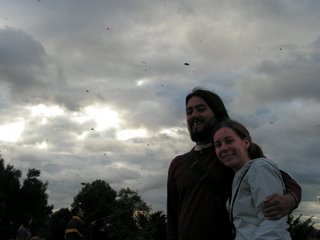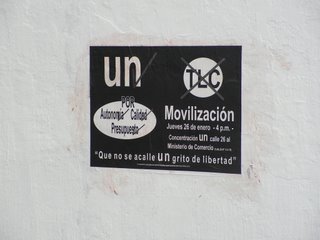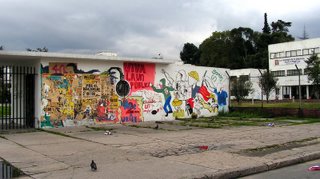
Today was Sunday. Not much happened - I missed the am meeting when I couldn't find the Alcaldia of the Candelaria and no one else knew where it was either, so I watched the Aguila girls shimmy past in the "Solidarity Parade" (if they'd really wanted to be in solidarity, there would have been significantly more cellulite on display...), ducked into the Septima flea market where I heard my name called, a nice feeling when you're thousands of miles and four months from home (Sundays alone are, well, lonely). An artisan I met yesterday remembered me! We chatted for a bit, I saw her goods and met her brother and sister. Bought some smelly plants, came home and took a nap.
Tonight, talked with my fiancee (that word making its first appearance here!) and my folks, and got encouraged about some things (weddings in the woods with children wearing Halloween costumes!) and discouraged about others.
That's the something, the stuff that comes up when you have nothing to do but sit around in an empty apartment, missing people and talking to your plants. Wow, that sounded pitiful. It didn't feel as bad as it sounds. There's something attractively melancholy about times like that, especially when you know they won't last forever. And my plants are truly good company. They grow and live and get greener every day - they've almost fully recovered from that scary time spent with Aimee and Trish (wonderful people, not so great at watering plants). Then Eli got back from Medellin, and just in time. Attractively melancholy has a way of turning into just plain lonely on a Sunday night. Why is it that Sunday nights are always so sad?
Anyway, I've not had the easiest time deciding "what to do with my life" [that phrase just doesn't invite insight, does it? In fact, it practically slams the door on it, heart beating a bit faster than before the doorbell rang.] Tonight talking with my folks, my dad apparently heard for the first time my plan of getting a teaching degree, a masters in teaching ESOL. He said something about it being an awful idea. I've tried teaching before and it was not a happy time -- I remember lots of migraines and frustration. But I was responsible for Spanish in two schools, pre-K through 8th grade, no books, no curriculum, and no clue what I was doing. And it wasn't all bad -- the moment of getting through is magical, when it happens.
I think part of my problem in answering that big question is feeling the desire to do something big, since the world's problems are so damn big, and being faced with personal smallness. So what is the answer? I'm just not sure research is going to do it for me. It fills some of what I'm looking for, but a very limited part, that part of me whose favorite question is still, "but why?" But the part of me that needs to feel useful in the world, the part that is currently going empty much of the time, that part it doesn't touch. And when I look at the careers of even academics I admire, it still seems to be missing. I can't go through my whole life without that, without feeling useful to a larger community besides my family, to whom I am of limited, occasional use, and sometimes just plain obnoxious.
I've been flirting with the idea and act of teaching for so long, and I keep coming back to it. I loved the idea of being a city planner, and think I'd do a good job, but it's not my passion. It's a technical pursuit, when what I'm looking for is building community. I also believe that anyone who wants to change something should first understand the status quo. People who work in education policy but have never taught in public schools? Makes zero sense to me.
So tonight I'm feeling a bit like a rock, small and round and maybe, just maybe, the perfect size and shape for something that will pick me, instead of me choosing it.















